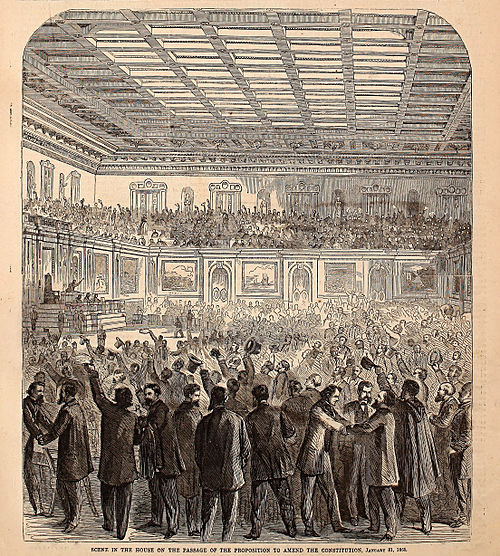Thirteenth Amendment to the United States Constitution
| This article is part of a series on the |
| Constitution of the United States of America |
|---|
 |
| Preamble and Articles of the Constitution |
| Amendments to the Constitution |
|
|
| Proposed Amendments |
| History |
| Full text of the Constitution and Amendments |
The Thirteenth Amendment was an amendment to the United States Constitution, meaning that it was a change to the basic and most important laws that govern the United States. It abolished slavery in the United States. It was passed in December 6, 1865, at the end of the Civil War with only a handful of Democrats supporting the Amendment in both Chambers of Congress. It was one of the Reconstruction Amendments. It repealed Article Four, Section 2, of the Constitution; the Fugitive Slave Clause.[1][unreliable source?]
Text
- Section 1. Neither slavery nor involuntary servitude, except as a punishment for crime whereof the party shall have been duly convicted, shall exist within the United States, or any place subject to their jurisdiction.
- Section 2. Congress shall have power to enforce this article by appropriate legislation.[2]
History
Prior to the Civil War, Constitution allowed slavery. However, many groups sought to end slavery in the United States. The groups became the Republican Party in 1856, and gained power in 1860 with the election of Abraham Lincoln.
In 1863, Lincoln issued the Emancipation Proclamation, which freed slaves only in certain parts of the United States, and did not actually make slavery illegal.
Near the end of the Civil War, Republicans, who controlled Congress, introduced an amendment to make slavery illegal (against the law) in every part of the United States. (In order for an amendment to happen, it first must be passed by both the United States Senate and the United States House of Representatives, and then passed by three-quarters of the states' legislatures.) The amendment was passed by three-quarters of the states, and became law in late 1865.
Photo gallery
- Hover over each photo to view label detail
Map showing slave-holding states in black, with slavery spreading westward (1847)
President Lincoln in 1861
Slaves working on a plantation, circa 1862–1863
Lincoln's Emancipation Proclamation only freed slaves in the red states on this map. It did not affect slaves in blue states (1863)
- Slave Market-Atlanta Georgia 1864.jpg
A slave trader's business in Atlanta, Georgia (1864)
- SlaveChildrenUnknown.jpg
Two ex-slave children freed by the 13th Amendment (circa 1870)
Sources
- ↑ Susan L. Boyd (April 1995). "A Look Into the Constitutional Understanding of Slavery". Ashbrook Center at Ashland University. Retrieved 17 March 2016.
- ↑ "13th Amendment | U.S. Constitution | LII / Legal Information Institute". Law.cornell.edu. 2012-11-20. Retrieved 2012-11-30.





